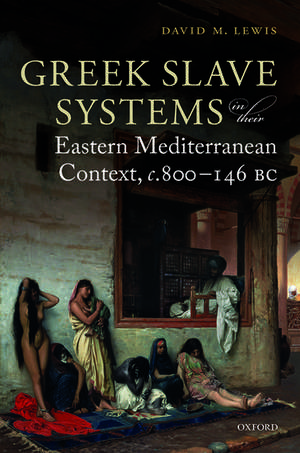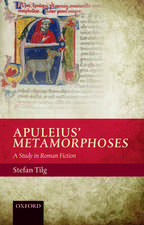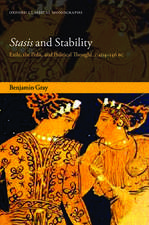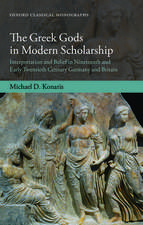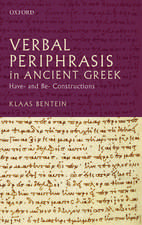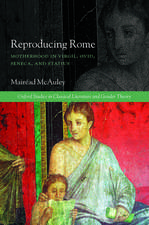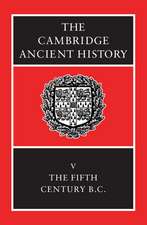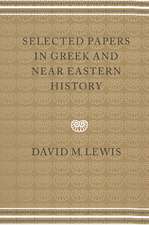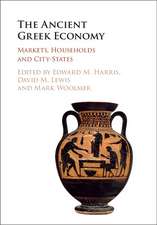Greek Slave Systems in their Eastern Mediterranean Context, c.800-146 BC
Autor David M. Lewisen Limba Engleză Hardback – 10 aug 2018
Preț: 704.70 lei
Preț vechi: 860.92 lei
-18% Nou
Puncte Express: 1057
Preț estimativ în valută:
134.85€ • 144.20$ • 112.43£
134.85€ • 144.20$ • 112.43£
Carte tipărită la comandă
Livrare economică 07-12 aprilie
Preluare comenzi: 021 569.72.76
Specificații
ISBN-13: 9780198769941
ISBN-10: 0198769946
Pagini: 384
Dimensiuni: 163 x 241 x 28 mm
Greutate: 0.74 kg
Editura: OUP OXFORD
Colecția OUP Oxford
Locul publicării:Oxford, United Kingdom
ISBN-10: 0198769946
Pagini: 384
Dimensiuni: 163 x 241 x 28 mm
Greutate: 0.74 kg
Editura: OUP OXFORD
Colecția OUP Oxford
Locul publicării:Oxford, United Kingdom
Recenzii
From its very title, David Lewis's book primes its reader for the new ground he is breaking [...] In short, L.'s book is truly a tour de force. He demonstrates the huge intellectual payoff of situating Greece in its eastern Mediterranean context, showing convincingly that slavery played a more entrenched role in a much broader range of societies than is generally thought.
This is an important book for people interested in Classics and for those interested in the Ancient Near East...a memorable book which will be valuably read by interested readers.
This ambitious work is the most important book to appear on slavery in the field of ancient Greek history for many years.
Lewis's monograph raises many complex questions . . . that will continue to provoke and inspire historians of slavery for many years to come. The book is all meat and no filler and is clearly written throughout. It is an important book and a valuable contribution to the field.
This is the most important contribution to our understanding of Greek slavery since the volume of essays, Slavery in Classical Antiquity: Views and Controversies, put together by Moses Finley in 1960. All subsequent discussions of Greek slavery will have to start from L.'s book.
[I]t opens a new path to analyse Greek slavery. . . . [It] will certainly become a necessary landmark in the scholarship on ancient slavery, and it is difficult to summarise its merits in a short space. It not only enlarges our knowledge of Greek and Near Eastern slaveries, but it also traces guidelines for future research about the Roman slave system, in the long term, in its Mediterranean context and in all its regional diversity.
While previous scholarship assumed that slavery in the Near East was marginal, Lewis shows that slaves constituted a major part of elite portfolios in many of these societies. This has revolutionary implications for the comparative study of Mediterranean and Near Eastern history in antiquity.
This is an important book for people interested in Classics and for those interested in the Ancient Near East...a memorable book which will be valuably read by interested readers.
This ambitious work is the most important book to appear on slavery in the field of ancient Greek history for many years.
Lewis's monograph raises many complex questions . . . that will continue to provoke and inspire historians of slavery for many years to come. The book is all meat and no filler and is clearly written throughout. It is an important book and a valuable contribution to the field.
This is the most important contribution to our understanding of Greek slavery since the volume of essays, Slavery in Classical Antiquity: Views and Controversies, put together by Moses Finley in 1960. All subsequent discussions of Greek slavery will have to start from L.'s book.
[I]t opens a new path to analyse Greek slavery. . . . [It] will certainly become a necessary landmark in the scholarship on ancient slavery, and it is difficult to summarise its merits in a short space. It not only enlarges our knowledge of Greek and Near Eastern slaveries, but it also traces guidelines for future research about the Roman slave system, in the long term, in its Mediterranean context and in all its regional diversity.
While previous scholarship assumed that slavery in the Near East was marginal, Lewis shows that slaves constituted a major part of elite portfolios in many of these societies. This has revolutionary implications for the comparative study of Mediterranean and Near Eastern history in antiquity.
Notă biografică
David M. Lewis is Lecturer in Greek History and Culture at the University of Edinburgh. He hails from the Ards Peninsula in Co. Down, Northern Ireland, and studied at Durham University, gaining his PhD in 2012. Between 2013 and 2016 he worked at the University of Edinburgh, first as a postdoctoral fellow, and then as a Leverhulme Early Career fellow, then in 2016 took up the post of Assistant Professor of Ancient History at the University of Nottingham. He returned to Edinburgh to take up his current post in 2018. His work focuses on Greek socio-economic history in a wider Eastern Mediterranean context.
